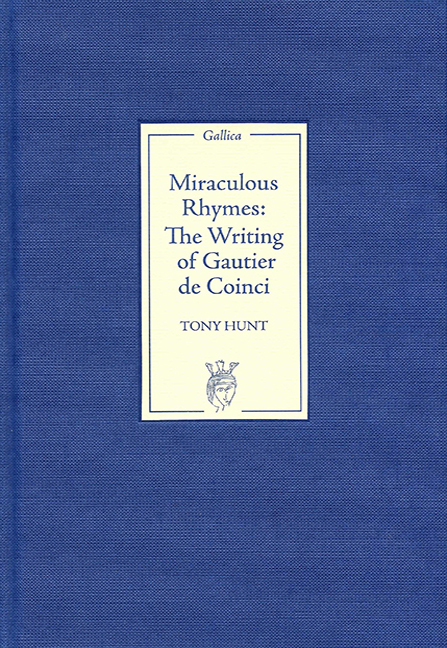Introduction
from Part I - The Writer and his Writing
Published online by Cambridge University Press: 29 April 2017
Summary
This is the first study in English to be devoted to one of the most remarkable writers of medieval France, indeed of the whole Middle Ages, who, despite his exceptional talents and pronounced personal traits, has been woefully neglected for half a century, with no appraisal of his work as a whole. Few medieval writers showed a more single-minded devotion to the Virgin Mary than the northern-French Benedictine monk Gautier de Coinci, whose two books of Marian miracles contain 58 narratives, 18 chansons and total approximately 35,500 octosyllabic lines, an astonishingly generous sample of literary Old French which qualitatively puts him on a par with the output of so celebrated a writer as Chrétien de Troyes, and quantitatively exceeds the entire medieval production of fabliaux, or of the Roman de Renart in its fullest extent. Scarcely less notable is the fact that no writers before the ‘Grands Rhétoriqueurs’, writing in the age of Louis XI, Charles VIII and Louis XII, showed such exuberant commitment to the figurae verborum of medieval rhetoric and such carefully, sometimes astringently, planned application of sophisticated wordplay to devotional themes. Beyond that, few medieval verse-writers matched Gautier in the inventiveness and richness of his rhymes, though, here again, scarcely any attention has been paid to this aspect of his writing. Another attraction is that Gautier is a rare example of the author as originator and architect of the unified book, carefully planned and executed according to his direction. The Miracles are ‘en devenir’, subject to a continual process of authorial revision, both piecemeal and as a totality, of quite fascinating complexity, as M. Okubo has recently shown in his meticulously detailed investigation of the genesis of the collection. There are few comparable cases in which the textual transmission of a work reveals quite so much about the author's purpose and the working of his mind.
The survival of his work, in part or whole, in 114 manuscripts (17 of which transmit the complete Miracles), with 61 deriving from the thirteenth century, cannot fail to impress, for its extent is exceeded only by the celebrated Roman de la Rose. In addition to questions of style and structure, there are also pictorial and musical dimensions to this imposing and inclusive artistic monument.
Information
- Type
- Chapter
- Information
- Miraculous RhymesThe Writing of Gautier de Coinci, pp. 3 - 20Publisher: Boydell & BrewerPrint publication year: 2007
